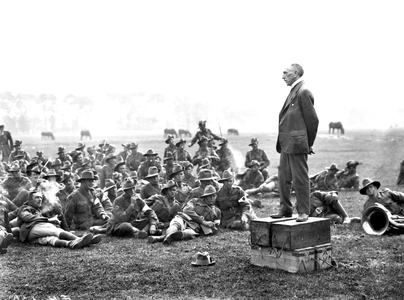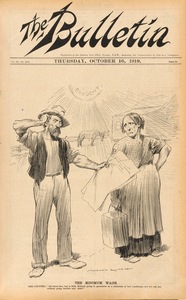Henry Bournes Higgins
Henry Bournes Higgins (1851-1929) was a liberal who believed in a positive role for the state in the economy. He was a member of the Victorian (1894-1900) and federal (1901-06) parliaments, before sitting on the High Court Bench (1906-29). As president (1907-20) of the Commonwealth Court of Conciliation and Arbitration, he made the celebrated Harvester judgement establishing a minimum wage. Courtesy Australian Dictionary of Biography
Events
Federal conciliation and arbitration power
Justice HB Higgins proposes a power to make laws with respect to ‘conciliation and arbitration for the prevention and settlement of industrial disputes extending beyond the limits of any one State’. The proposal is finally accepted at the 1898 Convention, providing the basis for the Commonwealth Conciliation and Arbitration Act 1904.
TAGS

Conscientious objection
The Defence Act 1903 is passed, providing for a national military force within Australia. All men aged 18 to 60 years are obliged to serve in war unless exempted on religious grounds. Only volunteers can serve overseas. Billy Hughes is a key proponent of compulsory military training but Justice HB Higgins presses for conscientious objection and the Act becomes the first national legislation to grant exemption from military service on the grounds of conscientious belief.
TAGS

Living wage — the Harvester Judgement
The Commonwealth Arbitration Court establishes the principle of a living wage - a fair and reasonable wage - to enable a man to support his wife and children in decent comfort. Justice HB Higgins hands down his decision after hearing HV Mackay’s Sunshine Harvester Company request for an exemption from paying excise duty. The ruling entitles unskilled male labourers to receive seven shillings per eight-hour working day. In related determinations, women are awarded around 54 per cent of the male rate. However, this is the first time an industrial tribunal establishes a wage for workers, rather than allow employees and employers to negotiate between themselves. This approach to wages is now known as wage fixing.
TAGS



